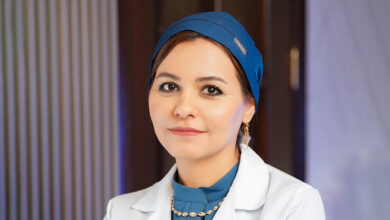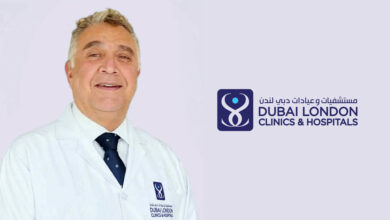Premier Executive Health Check: A Paradigm Shift in Proactive Healthcare

Medicine is undergoing a significant paradigm shift towards prevention and early detection today. In this context, “Hospitals” magazine interviewed Dr. Walid Honeineh, General Practitioner at Clemenceau Medical Center in Beirut, to highlight one of the center’s prominent initiatives: the Premier Executive Health Check. The discussion explored the program’s structure, clarified how it transcends conventional medical examinations, and underscored its crucial contribution to elevating community health awareness.
What is the Premier Executive Health Check program offered by CMC Beirut for early detection of silent diseases, designed to fit the demanding schedules of busy professionals?
Clemenceau Medical Center in Beirut proudly offers Premier Executive Health Check for the Early Detection of Silent Diseases, reflecting the principle that “an ounce of prevention is worth a pound of cure.”
The program includes a wide range of precise tests designed for the early detection of health problems.
For women, the program includes mammography and ultrasound for any woman aged 40 and above, along with a cervical smear (Pap test) to prevent abnormal cells or tumor development. The program also features a comprehensive eye and retina examination, intraocular pressure measurement, and an audiogram (hearing test).
For men, the program includes an abdominal and pelvic ultrasound to check prostate size and its impact on the bladder. If the patient is young and there are no specific concerns, some tests may be adjusted or removed from the program to suit the individual case. Additionally, colonoscopy from the age of 45 for both sexes is of utmost importance for detecting any polyps or masses in the colon that could develop into a tumor if left untreated.
Laboratory Screening Tests
- Laboratory studies for a complete blood count, urinalysis, and evaluation of blood chemistries, kidney function, fasting blood sugar, liver function tests, and thyroid function tests.
- Lipid evaluation was obtained through a thorough assessment of cholesterol levels.
- Hemoglobin A1C (blood sugar storage test) and urine microalbumin (for diabetes mellitus).
- Cancer screening: Carcinoembryonic Antigen (CEA) and CA-125 (for tumor detection in women).
- Prostate-Specific Antigen: to detect prostate cancer or prostate enlargement in men over the age of 40.
Cardiac Evaluation
- Cardiac Echocardiogram, evaluating the valves, heart muscle, and major vessels (Aorta and Pulmonary arteries).
- Cardiac stress test to screen for unrecognized coronary artery diseases, hypertension, and abnormal heart rhythm, as well as to evaluate how your heart responds to physical activity.
- Ultra-fast CT scan Revolution Apex for evaluation of coronary heart disease.
Carotid Ultrasound
- Screening of the carotid arteries of the neck for atherosclerosis and risk of stroke.
- Pulmonary Function Tests (pft)
- To evaluate how well your lungs work. The tests can diagnose lung diseases and measure the severity of lung problems.
Colonoscopy
A fiber-optic evaluation of the entire colon to identify if there are polyps, cancer or other abnormalities.
Total Body CT Scan
A new diagnostic technique that uses computed tomography to help identify potential problems and diseases before symptoms even appear. The scan examines six major areas of the body: the heart and major blood vessels. Lungs, abdomen, pelvis and brain. The scan includes:
- Bone densitometry (dexa scan): For both men and women to determine the presence of bone loss (osteoporosis/osteopenia).
- Nutritional counseling: Taking into account your overall assessment, medical history and personal goals, the dietician provides nutritional counseling, answers and questions about sports, nutrition and dietary supplements; also provides guidelines for healthy eating when dining out and traveling.
- Eye exam: A vision screening test and check for increased eye pressure that could lead to glaucoma, and an evaluation for cataracts.
- Audiogram: To evaluate your hearing and provide recommendations as needed for hearing amplification and preservation. For example, screening for HbA1c (glycated hemoglobin) can reveal diabetes or prediabetes before symptoms occur. Lipid profile tests similarly identify harmful cholesterol levels long before arterial damage begins. This early insight enables timely intervention and effective prevention.
The core strength of the program lies in its ability to detect health risks at their earliest stages, significantly boosting the chances of successful treatment and helping individuals maintain long-term health and well-being.
Personalized Treatment
Our program offers tailored healthcare solutions that take into account each individual’s age, gender, medical history, and presenting symptoms. This personalized approach ensures that every aspect of the patient’s health is carefully considered, allowing for a highly targeted and effective evaluation.
5-Star Hotel Services
Patients will enjoy premium accommodations, being admitted to a first-class room designed for comfort and privacy. Throughout their stay, they will be continuously accompanied by an executive nurse, ensuring attentive care and assistance at all times. A dedicated physician will oversee the patient’s case from start to finish, providing expert supervision. Upon completion of the program, patients will receive a comprehensive summary report detailing all findings, along with clear recommendations from the attending physician to guide their ongoing health management.
How does this program differ from routine checkups?
Clemenceau Medical Center’s Premier Executive Health Check surpasses traditional routine evaluations in scope and depth.
Whereas standard checkups typically target a single organ system or focus, such as basic blood tests or a general physical exam, the comprehensive program adopts a multisystem, integrated diagnostic approach.
Key advanced components include:
- Echocardiography (cardiac ultrasound) to assess myocardial function and valvular integrity.
- Exercise stress testing (treadmill ECG) to evaluate myocardial perfusion and detect potential coronary artery stenosis or occlusion.
- Pulmonary function stress testing (spirometry/VO₂ max) is aimed at diagnosing respiratory disorders, especially in smokers.
- Computed Tomography (CT) scanning for early detection of thoracic and abdominal lesions, granulomatous conditions (e.g., tuberculosis), neoplasms, or other structural abnormalities.
While routine exams remain essential and are strongly encouraged, this comprehensive medical screening program offers far greater diagnostic breadth, enabling the proactive detection of health issues at earlier stages and facilitating more effective preventative measures for long-term well-being.
How does this program contribute to raising health awareness in the community?
Established more than 20 years ago, this health program has a long-standing tradition of excellence and continuous improvement. It is regularly reviewed and updated to incorporate the latest medical advancements and best practices, ensuring that patients benefit from state-of-the-art preventive care and diagnostic services. It encourages the early detection of any silent diseases that may negatively affect the patient’s life. This early detection plays a vital role in maintaining an individual’s health and enabling them to live a normal and productive life.
Moreover, the impact of Premier Executive Health Check is not limited to individual health; it extends to promoting community health awareness as a whole. By providing these comprehensive examinations, the center contributes to spreading a culture of prevention and highlighting the importance of early detection of silent diseases, which may not show symptoms until advanced stages.
This, in turn, encourages individuals to take greater responsibility for their health, reduces misconceptions about illness, and prompts them to adopt better health behaviors and preventive lifestyles. Consequently, the proliferation of such programs contributes to building a healthier and more aware society, where the focus is on maintaining wellness before reaching the stage of complex and costly treatment.
What are the most prominent silent diseases this program focuses on? And why is early detection important before symptoms appear?
Specifically, the comprehensive screening program focuses on two vital aspects, in addition to other silent diseases.
First, we pay special attention to diabetes screening due to its significant impact on the body’s arteries and nerves, including the coronary arteries. It increases the risk of blood clots and atherosclerosis, in addition to its potential effects on nerves in the feet and the body as a whole.
Second, the examinations aim to evaluate tumor markers. These tests give us an initial idea of whether a patient is susceptible to developing any type of malignant tumor or if there is any anomaly that could lead to tumor formation. This focus allows us to intervene early and take the necessary preventive measures.
Who Do You Particularly Recommend This Program For?
This program is available to everyone, but we especially recommend it for businessmen and women who are short on time and find it difficult to visit multiple doctors at different appointments. The program typically starts at 9 AM and finishes by 4 PM. If needed, a colonoscopy can be added on the following day to check for any polyps or growths in the intestines.
How does the program link early detection with sustained patient care?
The program highlights its effectiveness in the early detection of silent diseases, especially diabetes, high cholesterol, and tumors. The goal isn’t just detection; it also extends to encouraging patients to adhere correctly to their medication.
Given the vast amount of information available online and through social media today, patients may question the side effects of medications. Therefore, we emphasize the importance of strictly following the doctor’s instructions regarding dosage and timing. This ensures these silent diseases are treated effectively before any symptoms appear, achieving the highest degree of prevention.
How Can You Book an Appointment for This Program at Clemenceau Medical Center?
You can book an appointment through the hospital’s International Office one to two days prior to your desired date. They’ll explain the program details, provide necessary instructions, and clarify how your case will be followed up. Within a maximum of two to three days after completing your examinations and leaving the center, you’ll receive a complete and ready medical file containing all your official test results. We also provide you with a timeline for recommended future examinations (every six months, one year, or three years) and a separate schedule for any medications you might need. We keep two copies of your medical file, soft and hard copies, and the file remains securely stored at the center for ten years. This allows our medical team to access all details of your health status anytime you visit the hospital.














